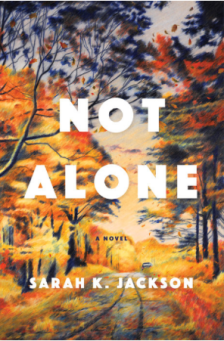Not Alone describes a future in which the world has done too little, too late to address the climate crisis. Katie and her son Harry live alone in a small city near London. Harry is almost five. His mother is the only person he’s ever known.
 Katie has become expert at foraging food from surviving plants and trapping rabbits, foxes, sometimes a dog. Harry’s father was in London when a toxic storm hit England. It was such a massive storm and so filled poisonous microfibers that it wiped out life as we know it.
Katie has become expert at foraging food from surviving plants and trapping rabbits, foxes, sometimes a dog. Harry’s father was in London when a toxic storm hit England. It was such a massive storm and so filled poisonous microfibers that it wiped out life as we know it.
“They started to find plastic dust in rivers, soils and even the air – and also in the vast oceans, millions of pieces per square metre, washed there like it was a great big watery garbage dump. All containing their own chemicals (poisons).”
During the first months after the storm, Katie ventured out to find Jack, the man she had been due to marry in a few months. Though they were well aware of the climate crisis — Katie working with an environmental group, Jack a nurse — they were thrilled with the plans they’d made for a life together. When Jack set-off for the hospital, knowing they’d need him when the storm hit, he had no idea that the storm would define the end of ‘Before’ and yield a post-apocalyptic after.
Since giving birth alone in her barricaded flat, gradually giving up hope for Jack, Katie lives solely for Harry. Though she’s tried to protect herself from the poisonous dust when she has to go outdoors, she’s beginning to feel her lungs burn when she exerts herself. She’s becoming desperate for Harry’s future when she discovers a note that Jack had hidden away. He had returned to their flat when she was out looking for him nearly five years earlier.
The note describes his destination and explains how she can get there with the resources he secreted away.
Their trek north is arduous at every turn. Nearly all of the few survivors they encounter are dangerous. The land they travel is rife with “dread brown grass and leafless dying trees, everything withering and winking out, brown and black, the sky an unsettling thick grey haze that blocks the sun . . . and still that dry, unpleasant chemical taste to the air.”
Katie has sheltered Harry from the truth. Other than what he sees in his storybooks, he knows nothing of what life was like ‘Before’. When they encounter bodies in cars and in buildings where they scavenge, she tells Harry they’re sleeping. But when Katie becomes so desperate for food that she kills and roasts a rabbit right in front of him, she finally explains what death is.
“And when you’re dead you never wake up again?” Harry asks.
Wanting to soften his understanding, Katie assures him, “You get to live every day, you only die once.”
I will not tell you whether they find Jack, but I will tell you that Katie manages to keep hope alive and, in the end, that desperate spark of hope is rewarded.
P.S. Coincidentally, I was reading Greta Thunberg’s The Climate Book the day I received an advance copy of Jackson’s novel. Thunberg offers far more optimism than Jackson. The former details all the climate solutions we have at hand. The latter describes the consequences of not committing ourselves to them. I suggest reading the two in tandem.

We’re seeing more and more ecofiction these days, Dave. The role of climate nonfiction should be, I think, to present the solutions; climate fiction should inspire us to implement those solutions as fully and quickly as possible.
LikeLike